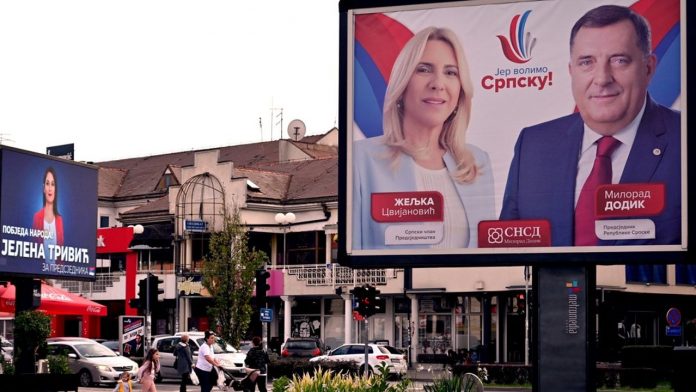Posted Oct 1, 2022, 8:30 AM
It is a fractured country and on the edge of a failed state, an hour by plane from Paris, which is holding its general elections this Sunday.
Almost thirty years after the end of a civil war that claimed more than 100,000 victims and left Sarajevo the longest siege of a European city since 1943, when Yugoslavia broke up, Bosnia and Herzegovina is still torn between three ethno-religious communities: Bosniaks (Muslims, half of the 3 million inhabitants, the Bosnians), Croats (Catholics, 15%) and Serbs (Orthodox, a third of the population).
Poverty, corruption, trafficking
The staggeringly complex institutional arrangement resulting from the Dayton peace accords in 1995, under Western sponsorship, has not brought the country together, nor does it seem economically viable , still on an international drip. This does not prevent him from having obtained in 2016 the status of candidate for entry into the European Union, even if since then the negotiations have been at a standstill.
Despite assets, fertile land, iron and aluminum mines, the average salary barely exceeds 500 euros. Unemployment officially affects 15% of the active population, but in reality much more, and more than double among young people. A seventh of the population has taken the road to exile in the past ten years. And inflation is going over 20%. Bosnia is also the country in Europe where the worst corruption is rife, along with Albania and Kosovo, as well as trafficking, particularly of arms and stolen cars. Half of the employees are employed in the sprawling administration in which they are recruited by piston and which absorbs a third of tax revenue.
A complex and dysfunctional institutional arrangement
This picture, which is hardly idyllic on the economic and social level, nevertheless seems less black than the political. Indeed, the Dayton Accords had provided for Bosnia to be made up of two entities with broad autonomy in matters of police, education, economy, health, one Serbian, the Republika Srpska (RS) and the other a Croatian-Muslim Federation. All under the aegis of a central power (army, finance, justice, diplomacy) led by a collegial presidency of three members, a Croat, a Bosnian, a Serb, supposed to somehow cement the country.
The problem is that the RS and the Croat-Muslim Federation do not even recognize each other legally or territorially. The RS wants to become a state in its own right, which would have privileged links with Serbia and… Russia. Milorad Dodik, the leader of the Bosnian Serbs, who, unless surprised, should win the presidency of the RS, multiplies the secessionist threats, declaring “Bosnia-Herzegovina is not the place where we want to stay for long”.
To which the leader of the main nationalist party of Bosnians (Muslims), Bakir Izetbegovic, replied by advising “Dodik and those like him to go to another country which they find more beautiful”. But the Federation is also in crisis, with Croats angry at what they see as Muslim domination. All Croatian parties are calling for their own entity or at least a modification of the electoral rules.
The most serious crisis since the peace of 1995
“Bosnia and Herzegovina is experiencing the most serious political crisis since the signing of the peace agreement,” political analyst Ranko Mavrak, based in Sarajevo, told AFP, “the ethnic divisions are so deep that they represent really a danger to the survival and integrity of the country”.
As a result, too, of this institutional mille-feuilles, the voters choose Sunday the deputies of the central Parliament, those of the two entities, as well as the president of the RS and the tripartite presidency, from which therefore arise three governments, in addition to those of ten districts, not even counting the district of Brčko, under the direct administration of the UN. Result, if in proportion to its population, France had as many ministers and parliamentarians as Bosnia, it would have 4,800 deputies and 1,800 ministers…













